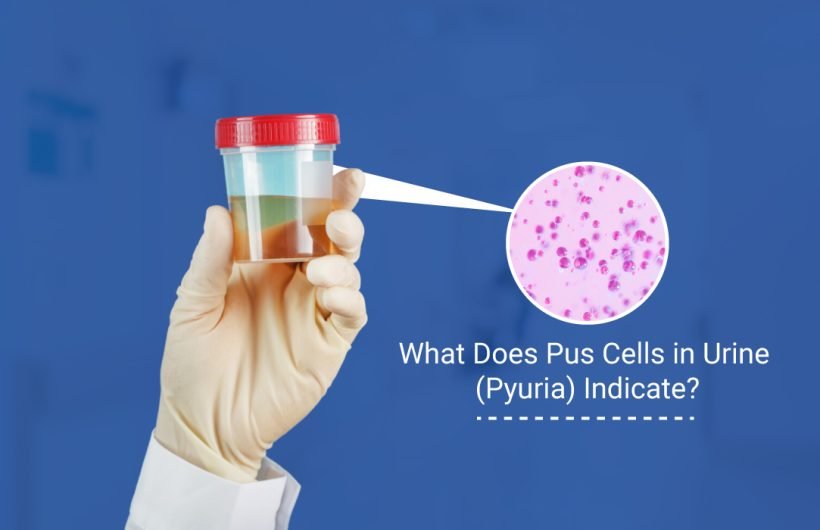Pyuria, a term stemming from the Greek words “pyo,” meaning pus, and “uria,” pertaining to urine, represents a condition marked by the presence of pus cells in the urine. While discovering pus in one’s urine may raise concerns, comprehending its implications, underlying causes, associated symptoms, diagnostic procedures, treatment options, preventive measures, and overall management is crucial for maintaining urinary tract health and overall well-being.
Understanding Pyuria, What is it ?
Pyuria signifies an elevated concentration of white blood cells or pus within the urine, indicative of an underlying infection or inflammatory process within the urinary tract. Pus, a viscous fluid comprising white blood cells, dead tissue, and bacteria, serves as the body’s natural defense mechanism against infections. Clinically, this conditions confirmed when the urine contains 10 or more white blood cells per cubic millimeter.
Symptoms of Pyuria
Common symptoms include the presence of cloudy urine and visible pus. When associated with urinary tract infections (UTIs), additional symptoms may manifest, such as:
- Pain in the flank, abdomen, or pelvic region.
- Pressure in the lower pelvis.
- Increased frequency and urgency of urination.
- Urinary incontinence.
- Dysuria (painful urination).
- Hematuria (blood in urine).
- Fever.
- Nausea and vomiting.
What Causes Pyuria?
While UTIs serve as the primary cause of pus cells in urine, several other factors contribute to its development:
- Sexually Transmitted Infections (STIs): Including gonorrhoea, human papillomavirus (HPV), syphilis, and HIV.
- Viral Infections: Such as adenovirus.
- Other Medical Conditions: Such as interstitial cystitis, pneumonia, tuberculosis, sepsis, kidney stones, and organ transplant rejection.
- Medication Usage: Prolonged use of certain medications like NSAIDs, antibiotics containing penicillin or sulfa, diuretics, and proton pump inhibitors.
How is Pyuria confirmed?
Healthcare providers diagnose this disease through a urinalysis, a simple yet effective test wherein a urine sample is examined for the presence of white blood cells, bacteria, and blood under a microscope. This diagnostic procedure aids in confirming the condition and guiding subsequent treatment decisions.
Management and Treatment
Pus cells in urine treatment options primarily revolves around addressing its underlying cause. For UTIs and bacterial STIs, antibiotics constitute the cornerstone of treatment. Completing the full course of prescribed antibiotics is imperative to prevent recurrence and the development of antibiotic resistance. If symptoms persist post-treatment, consulting a healthcare provider for further evaluation is advisable to rule out alternative diagnoses.
Prevention Is Key
Reducing the risk of this condition entails adopting preventive measures aimed at mitigating the occurrence of UTIs and STIs:
- Maintain Good Hygiene: Practise proper hygiene habits, including wiping from front to back after urination or bowel movements, and changing menstrual hygiene products regularly.
- Stay Hydrated: Adequate fluid intake aids in flushing out bacteria from the urinary tract.
- Choose Appropriate Attire: Opt for loose-fitting clothing to keep the genital area dry and inhibit bacterial growth.
- Urinate After Intercourse: Emptying the bladder post-intercourse helps eliminate bacteria from the urinary tract.
- Practise Safe Sexual Habits: Consistent condom use and regular STI testing reduce the risk of contracting sexually transmitted infections.
Outlook / Prognosis
With prompt diagnosis and appropriate treatment, pyuria typically responds well, and prognosis remains favorable. However, persistent or recurrent symptoms warrant further evaluation by healthcare providers to rule out underlying complications or alternative diagnoses.
Living With Pyuria
Any alterations in urinary habits or the onset of UTI or STI symptoms necessitate prompt medical attention. Maintaining open communication with healthcare providers facilitates timely diagnosis, treatment, and management of this condition, ensuring optimal health outcomes.
Who to consult in pyuria ?
In cases of pus cells in urine, determining whether to consult a urologist or nephrologist depends on the underlying cause and specific symptoms. Urologists specialize in urinary tract disorders and male reproductive system conditions, making them suitable for pyuria related to urinary tract infections, bladder issues, or kidney stones. Nephrologists, on the other hand, focus on kidney diseases and conditions affecting kidney function, making them appropriate for it accompanied by kidney-related symptoms like proteinuria or hematuria. Primary care physicians may initially evaluate this conditionand refer patients to the appropriate specialist based on clinical presentation and diagnostic findings, ensuring tailored management and care.
Conclusion
In conclusion, the pyuria management necessitates a nuanced approach, considering the underlying causes, symptoms, and appropriate specialist consultation. Whether consulting a urologist for urinary tract-related issues or a nephrologist for kidney-related concerns, individuals can expect personalized care tailored to their unique medical needs. Additionally, it’s imperative to acknowledge the expertise of urology like Dr. Saket Narnoli, whose specialized knowledge and dedication to urinary tract health contribute significantly to the effective diagnosis, treatment, and management of. By fostering collaboration between patients and skilled medical professionals like Dr. Saket Narnoli, individuals can navigate the complexities of it with confidence, ensuring optimal outcomes and improved quality of life.






